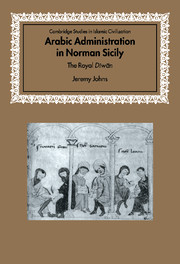Book contents
- Frontmatter
- Contents
- Preface
- Tables
- Abbreviations
- Genealogical table of the De Hautevilles of Sicily
- Note on Measurements
- Introduction
- 1 ‘In the time of the Saracens …’
- 2 ‘When first the Normans crossed into Sicily …’
- 3 ‘Our lady, the Regent Adelaide, and our Lord, the Count Roger, her son’, 1101–30
- 4 The earliest products of the royal dīwān, 1130–43
- 5 The jarāʾid renewed, 1144–5
- 6 The records of the royal dīwān. Part I: the jarāʾid al-rijāl
- 7 The records of the royal dīwān. Part II: the dafātir al-ḥudūd
- 8 The duties and organisation of the royal dīwān, 1141–94
- 9 ‘The people of his state’. The ‘palace Saracens’ and the royal dīwān
- 10 The Norman dīwān and Fāṭimid Egypt
- 11 Royal dīwān and royal image
- Appendix 1 Catalogue of dīwānī documents
- Appendix 2 Provisional catalogue of private documents
- Appendix 3 Abū Tillīs – ‘Old Wheat-sack’
- List of References
- Index
- Titles in the series
3 - ‘Our lady, the Regent Adelaide, and our Lord, the Count Roger, her son’, 1101–30
Published online by Cambridge University Press: 10 March 2010
- Frontmatter
- Contents
- Preface
- Tables
- Abbreviations
- Genealogical table of the De Hautevilles of Sicily
- Note on Measurements
- Introduction
- 1 ‘In the time of the Saracens …’
- 2 ‘When first the Normans crossed into Sicily …’
- 3 ‘Our lady, the Regent Adelaide, and our Lord, the Count Roger, her son’, 1101–30
- 4 The earliest products of the royal dīwān, 1130–43
- 5 The jarāʾid renewed, 1144–5
- 6 The records of the royal dīwān. Part I: the jarāʾid al-rijāl
- 7 The records of the royal dīwān. Part II: the dafātir al-ḥudūd
- 8 The duties and organisation of the royal dīwān, 1141–94
- 9 ‘The people of his state’. The ‘palace Saracens’ and the royal dīwān
- 10 The Norman dīwān and Fāṭimid Egypt
- 11 Royal dīwān and royal image
- Appendix 1 Catalogue of dīwānī documents
- Appendix 2 Provisional catalogue of private documents
- Appendix 3 Abū Tillīs – ‘Old Wheat-sack’
- List of References
- Index
- Titles in the series
Summary
In the previous chapter, it was argued that the origins of the Arabic administration of Norman Sicily must be sought in the periods of conquest and of distribution of the spoils which followed the cessation of hostilities. During the conquest itself, a group of specialists attached to the de Hautevilles’ staff was responsible for the negotiation and compilation of surrender treaties which recorded the terms of the post-conquest settlement. If, as is probable, these amāns were written, then they are likely to have constituted one root from which the Arabic administration grew. Again, during the period of conquest, it is likely that the same group of specialists, whenever possible, seized and preserved the tax-records of the Muslim administration. These were adapted to post-conquest needs, and used by Roger and his staff as the basis for the distribution of both lands and communities of the indigenous population. They are likely to have been the second root of the early Arabic administration of Norman Sicily. However, after an initial burst of activity, which seems to have been concentrated in c. 1093–5, the Arabic administration becomes more difficult to observe. This is probably, in part, the result of a combination of factors, including political vicissitudes, the random distribution of surviving documents, and the high number of deperdita. Nonetheless, the issue of documents in Arabic does seem to have ceased after Roger II assumed sole rule in 1112 and, from then until his coronation in 1130, the comital administration was predominantly Greek, and its activities were concentrated in eastern Sicily and Calabria, rather than in the Arabic-speaking west of Sicily.
- Type
- Chapter
- Information
- Arabic Administration in Norman SicilyThe Royal Diwan, pp. 63 - 90Publisher: Cambridge University PressPrint publication year: 2002

